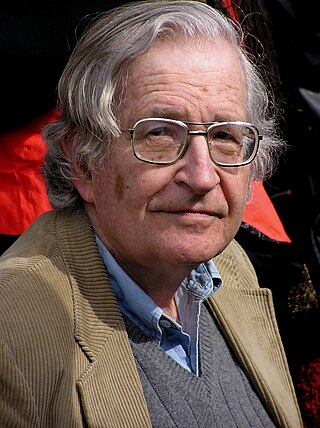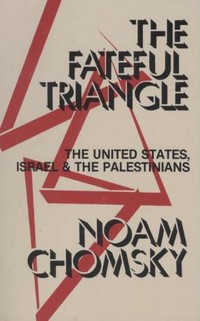The domino theory is a geopolitical theory which posits that increases or decreases in democracy in one country tend to spread to neighboring countries in a domino effect. It was prominent in the United States from the 1950s to the 1980s in the context of the Cold War, suggesting that if one country in a region came under the influence of communism, then the surrounding countries would follow. It was used by successive United States administrations during the Cold War as justification for American intervention around the world. Former U.S. President Dwight D. Eisenhower described the theory during a news conference on 7 April 1954, when referring to communism in Indochina as follows:
Finally, you have broader considerations that might follow what you would call the "falling domino" principle. You have a row of dominoes set up, you knock over the first one, and what will happen to the last one is the certainty that it will go over very quickly. So you could have a beginning of a disintegration that would have the most profound influences.
Neocolonialism is the continuation or reimposition of imperialist rule by a state over another nominally independent state. Neocolonialism takes the form of economic imperialism, globalization, cultural imperialism and conditional aid to influence or control a developing country instead of the previous colonial methods of direct military control or indirect political control (hegemony).
Perpetual war, endless war, or a forever war, is a lasting state of war with no clear conditions that would lead to its conclusion. These wars are situations of ongoing tension that may escalate at any moment, similar to the Cold War. From the late 20th century, the concepts have been used to critique the United States Armed Forces interventions in foreign nations and the military–industrial complex such as the Vietnam War and the Soviet-Afghan War, or wars with ambiguous enemies such as the war on terror or war on drugs.

The Council on Foreign Relations (CFR) is an American think tank specializing in U.S. foreign policy and international relations. Founded in 1921, it is an independent and nonpartisan nonprofit organization. CFR is based in New York City, with an additional office in Washington, DC. Its membership has included senior politicians, numerous secretaries of state, CIA directors, bankers, lawyers, professors, corporate directors and CEOs, and senior media figures.
The expression military–industrial complex (MIC) describes the relationship between a country's military and the defense industry that supplies it, seen together as a vested interest which influences public policy. A driving factor behind the relationship between the military and the defense-minded corporations is that both sides benefit—one side from obtaining war weapons, and the other from being paid to supply them. The term is most often used in reference to the system behind the armed forces of the United States, where the relationship is most prevalent due to close links among defense contractors, the Pentagon, and politicians. The expression gained popularity after a warning of the relationship's detrimental effects, in the farewell address of President Dwight D. Eisenhower on January 17, 1961.

The propaganda model is a conceptual model in political economy advanced by Edward S. Herman and Noam Chomsky to explain how propaganda and systemic biases function in corporate mass media. The model seeks to explain how populations are manipulated and how consent for economic, social, and political policies, both foreign and domestic, is "manufactured" in the public mind due to this propaganda. The theory posits that the way in which corporate media is structured creates an inherent conflict of interest and therefore acts as propaganda for anti-democratic elements.

George Wildman Ball was an American diplomat and banker. He served in the management of the US State Department from 1961 to 1966 and is remembered most as the only major dissenter against the escalation of the Vietnam War. Ball advised against deploying U.S. combat forces, as he believed it would lead the United States into an unwinnable war and result in a prolonged conflict. Instead, he argued that the United States should prioritize allocating its resources to Europe rather than engaging in expensive military ventures. He refused to publicize his doubts. He helped determine American policy regarding trade expansion, Congo, the Multilateral Force, de Gaulle's France, Israel and the rest of the Middle East, and the Iranian Revolution.

Hegemony or Survival: America's Quest for Global Dominance is a study of the American empire written by the American linguist and political activist Noam Chomsky, a professor at the Massachusetts Institute of Technology. It was first published in the United States in November 2003 by Metropolitan Books and then in the United Kingdom by Penguin Books.
Edward Samuel Herman was an American economist, media scholar and social critic. Herman is known for his media criticism, in particular the propaganda model hypothesis he developed with Noam Chomsky, a frequent co-writer. He held an appointment as Professor Emeritus of finance at the Wharton School of Business of the University of Pennsylvania. He also taught at Annenberg School for Communication at the University of Pennsylvania.

Andrew J. Bacevich Jr. is an American historian specializing in international relations, security studies, American foreign policy, and American diplomatic and military history. He is a Professor Emeritus of International Relations and History at the Boston University Frederick S. Pardee School of Global Studies. He is also a retired career officer in the Armor Branch of the United States Army, retiring with the rank of colonel. He is a former director of Boston University's Center for International Relations, now part of the Pardee School of Global Studies. Bacevich is the co-founder and president of the Quincy Institute for Responsible Statecraft.

Noam Chomsky is an intellectual, political activist, and critic of the foreign policy of the United States and other governments. Noam Chomsky describes himself as an anarcho-syndicalist and libertarian socialist, and is considered to be a key intellectual figure within the left wing of politics of the United States.

The Anti-Chomsky Reader is a 2004 anthology book about the linguist and social critic Noam Chomsky edited by Peter Collier and David Horowitz. Its contributors criticize Chomsky's political and linguistic writings, claiming that he cherry-picks facts to fit his theories.

The Fateful Triangle: The United States, Israel and the Palestinians is a 1983 book by Noam Chomsky about the relationship between the US, Israel and the Palestinians. Chomsky examines the origins of this relationship and its meaningful consequences for the Palestinians and other Arabs. The book mainly concentrates on the 1982 Lebanon War and the "pro-Zionist bias" of most US media and intellectuals, as Chomsky puts it.
This is a list of writings published by the American author Noam Chomsky.
The American Empire Project is a book series that deals with imperialist and exceptionalist tendencies in US foreign policy in the early 21st century. The series is published by Metropolitan Books and includes contributions by such notable American thinkers and authors as Noam Chomsky, Howard Zinn, Chalmers Johnson and Andrew Bacevich. The project's goal is to critique what the authors consider the imperial ambitions of the United States and to explore viable alternatives for foreign policy.

Gaza in Crisis: Reflections on Israel's War against the Palestinians is a 2010 collection of interviews and essays from Noam Chomsky and Ilan Pappé that examine Israel's Operation Cast Lead and attempts to place it into the context of Israeli–Palestinian conflict. The book was edited by Frank Barat, who had conducted his first e-mail interview on the subject with Chomsky in 2005, as a result of his joint dialogue with Chomsky and Pappé, previously published as Le Champ du possible, which forms the heart of the work.

Fredrik Logevall is a Swedish-American historian and educator at Harvard University, where he is the Laurence D. Belfer Professor of International Affairs at the John F. Kennedy School of Government and professor of history in the Harvard Faculty of Arts and Sciences. He is a specialist in U.S. politics and foreign policy. Logevall was previously the Stephen and Madeline Anbinder Professor of History at Cornell University, where he also served as vice provost and as director of the Mario Einaudi Center for International Studies. He won the 2013 Pulitzer Prize for History for his book Embers of War: The Fall of an Empire and the Making of America’s Vietnam. His most recent book, JFK: Coming of Age in the American Century, 1917-1956 (2020), won the Elizabeth Longford Prize for Historical Biography and was a New York Times Notable Book of the Year.

Occupy is a short study of the Occupy movement written by the American academic and political activist Noam Chomsky. Initially published in the United States by the Zuccotti Park Press as the first title in their Occupied Media Pamphlet Series in 2012, it was subsequently republished in the United Kingdom by Penguin Books later that year.

Cambodian genocide denial was the belief expressed by many Western academics that claims of atrocities committed by the Khmer Rouge government (1975–1979) in Cambodia were much exaggerated. Many scholars of Cambodia and intellectuals opposed to the U.S. involvement in the Vietnam War denied or minimized the human rights abuses of the Khmer Rouge, characterizing contrary reports as "tales told by refugees" and U.S. propaganda. They viewed the assumption of power by the Communist Party of Kampuchea as a positive development for the people of Cambodia who had been severely impacted by the Vietnam War and the Cambodian Civil War. On the other side of the argument, anti-communists in the United States and elsewhere saw in the rule of the Khmer Rouge vindication of their belief that the victory of Communist governments in Southeast Asia would lead to a "bloodbath."
The Yinon Plan refers to an article published in February 1982 in the Hebrew journal Kivunim ("Directions") entitled 'A Strategy for Israel in the 1980s'. The article was penned by Oded Yinon, reputedly a former advisor to Ariel Sharon, a former senior official with the Israeli Foreign Ministry and journalist for The Jerusalem Post.











